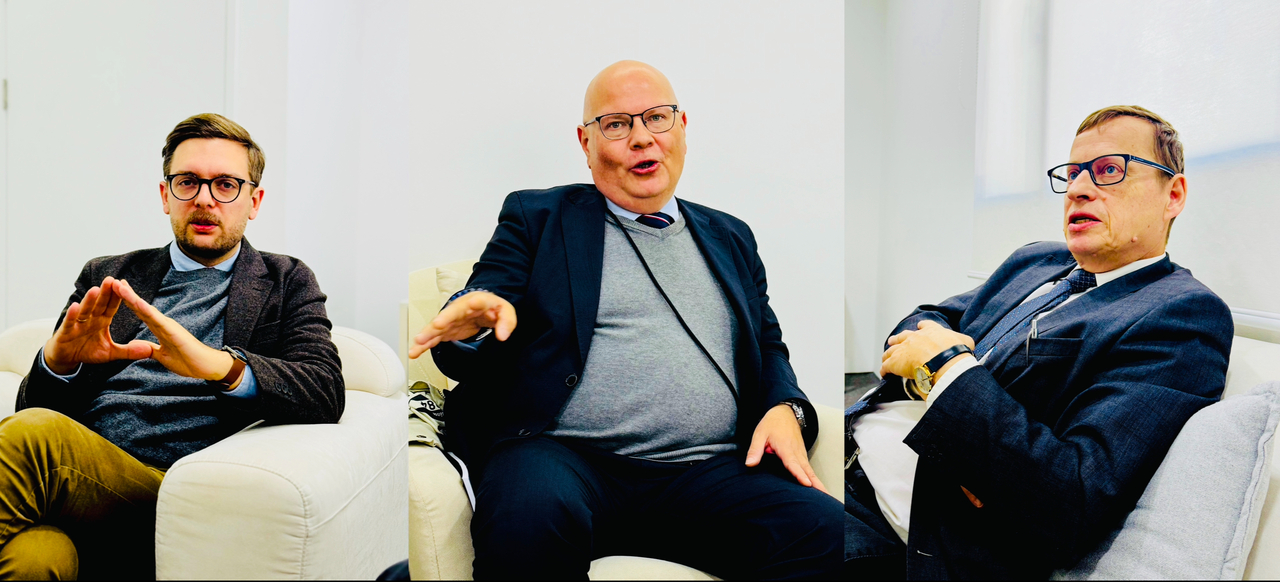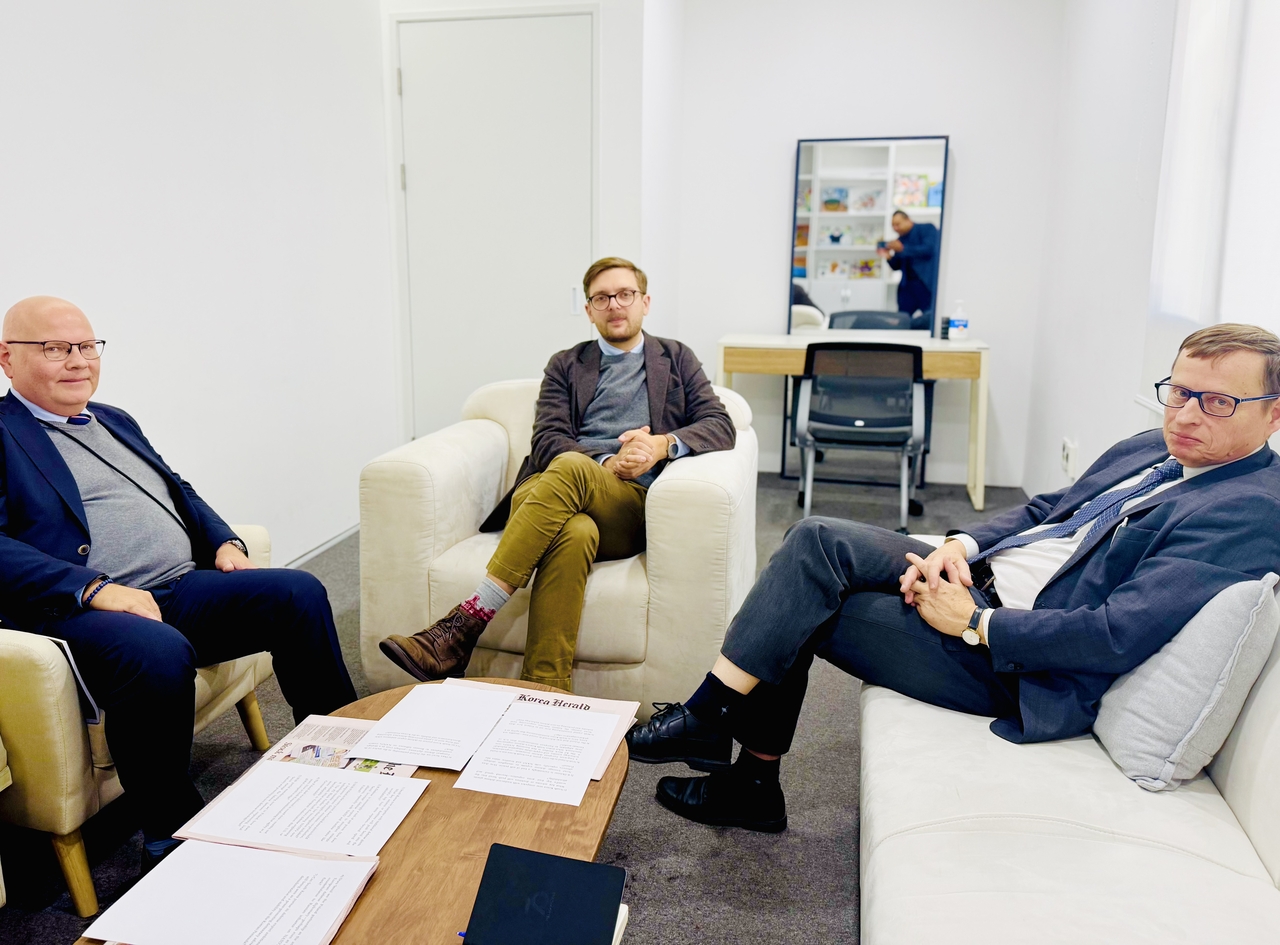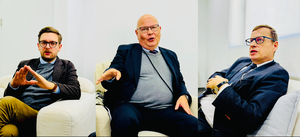 Jakub Jakobowski (left), deputy director of the OSW Center for Eastern Studies, Witold Rodkiewicz (right), analyst at the OSW Center for Eastern Studies. and Marek Menkiszak, head of the Russian Department at the OSW Center for Eastern Studies, speak in an interview with The Korea Herald at Herald Square in Yongsan-gu, Seoul, on Wednesday. (Sanjay Kumar/The Korea Herald)
Jakub Jakobowski (left), deputy director of the OSW Center for Eastern Studies, Witold Rodkiewicz (right), analyst at the OSW Center for Eastern Studies. and Marek Menkiszak, head of the Russian Department at the OSW Center for Eastern Studies, speak in an interview with The Korea Herald at Herald Square in Yongsan-gu, Seoul, on Wednesday. (Sanjay Kumar/The Korea Herald) South Korea is a crucial partner for Poland in its drive to bolster its defense, but Seoul must make hard choices in the face of shifting security challenges, say experts from the OSW Center for Eastern Studies, a Polish government-affiliated think tank.
Speaking in an interview in Seoul on Oct. 22, OSW analyst Witold Rodkiewicz warned that Korean firms operating in Russia indirectly support Moscow’s war machine and that too much hedging could place South Korean industries in a precarious position.
“Choices must be made — you cannot hedge both ways. Maintaining industrial presence in Russia comes at a strategic cost,” Rodkiewicz said, noting that Poland’s defense imports from Korea have created new opportunities that offset markets lost in Russia.
“If Korea hedges too much, it risks losing on both sides. Europe’s experience shows that economic interdependence with Russia brings vulnerability, not stability.”
The OSW experts also stressed that the issue does not only concern Russia and its ambitions in the West, but has larger implications that make collaboration with Korea crucial.
OSW experts, including deputy director Jakub Jakobowski and Marek Menkiszak, chief of OSW’s Russian Department, said that the deepening ties among China, Russia and North Korea are a growing concern.
Citing North Korea’s dispatch of troops to the Russia-Ukraine conflict, the experts said the war is a part of a larger issue that could shake the world order and add uncertainties for South Korea.
According to Menkiszak, China’s recent military parade attended by Russian President Vladimir Putin and North Korean leader Kim Jong-un is a sign of “China’s central role in a new bloc.”
Yet, he cautioned, “the triangle among China, Russia and North Korea is not particularly cohesive.”
Menkiszak warned that Russia’s confrontation with the West is systemic and long-term.
“Russia seeks to dismantle the Western-led order and drive the US out of Eurasia. If that happens, Korea will find itself at China’s mercy,” Menkiszak said.
The experts noted an underestimation in South Korea of Russia’s global ambitions, referring to the “Greater Eurasia Project,” which they said aims to create a Sino-Russian condominium, directly affecting Korea’s strategic future.
Menkiszak added that Russia uses North Korea to apply pressure on South Korea, while China benefits strategically from Russian victories.
“This forms a shared challenge for Poland and Korea,” he said.
 Jakub Jakobowski (left), deputy director of the OSW Center for Eastern Studies, Witold Rodkiewicz (right), analyst at the OSW Center for Eastern Studies, and Marek Menkiszak, head of the Russian Department at the OSW Center for Eastern Studies, speak in an interview with The Korea Herald at Herald Square in Yongsan-gu, Seoul, on Wednesday. (Sanjay Kumar/The Korea Herald)
Jakub Jakobowski (left), deputy director of the OSW Center for Eastern Studies, Witold Rodkiewicz (right), analyst at the OSW Center for Eastern Studies, and Marek Menkiszak, head of the Russian Department at the OSW Center for Eastern Studies, speak in an interview with The Korea Herald at Herald Square in Yongsan-gu, Seoul, on Wednesday. (Sanjay Kumar/The Korea Herald) Since Russia’s invasion of Ukraine, Poland has been purchasing South Korean weapons systems to bolster its defense capabilities. The move has coincided with the South Korean government’s drive to grow into one of the world’s top four defense exporters.
“South Korean weapons systems are high-quality and proven. But we also need rapid delivery because a major conflict with Russia cannot be ruled out within a few years,” said Jakobowski.
Describing Poland’s defense needs as driven by urgent security concerns, the OSW experts said that Warsaw is seeking assurances that Seoul will remain a reliable partner in the event of a conflict with Russia.
“We must know that South Korea understands why we are buying these weapons — not for parades, but for potential real-world conflict,” Jakobowski said, underscoring that reliability entails trusting South Korea to stand firm and not yield to external pressure.
Jakobowski noted that Europe’s security is closely linked to East Asia. Poland considers South Korea its “most important partner in East Asia, second only to the US in military procurement.”
“This is not just about technology transfer. It’s about ensuring supply chain stability if conflicts erupt simultaneously in Europe or the Indo-Pacific,” Jakobowski said, adding that a parallel production base outside Asia gives Korea a strategic advantage.
“If communication lines break or supply chains collapse, this redundancy ensures resilience for both sides,” he pointed out.
According to OSW analyst Rodkiewicz, “the most important reassurance is that Korea understands Poland’s strategic predicament.”
“We need a committed partner that recognizes shared security challenges — not merely a distant export market,” he said.
sanjaykumar@heraldcorp.com
